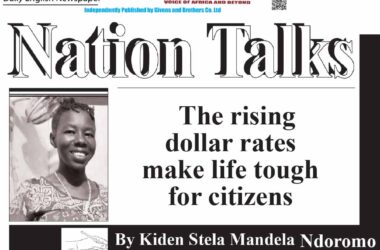By Ustaz Mark Bang
The answer is that the government we all know, whether from here in South Sudan, Africa, or the world, belongs to you, him, or me.
Don’t ever think dully, my brother or sister that it belongs to Mr. C or D; never, it’s us, and if it’s us, we have to caution whosoever finds it hard to foster for her/his nation. I, you, and she/he have those privileges to carry on administering for our people and the nation.
Who owns the government if not the people who live in the country?
The federal government owns the government. Also, the billionaires behind the curtain own the federal government. Rothschild, George Soros, and I could go on forever. You get my point. The government, institutionally, ‘owns’ nothing. The public (the USA) owns stuff and installs the government to manage both the public assets and to act in the public interest. Our government is essentially an empowered agent employed by the people under an elegant, flexible, and durable contract written by some really brilliant guys 240 years ago.
When Tsar Nicolas II was filling up his census form in the last pre-revolutionary census in Russia, he specified his occupation as “the owner of Russia’s land.” As you have probably heard, that didn’t last. In a truly democratic country, the government owns nothing. Most countries are not democracies. You need to remember that. And another thing to remember is that what is is not necessarily what it should be. And it should be, but it will probably never be.
The law has to deal with the actual facts on the ground. High-minded ideals don’t keep people fed, and most people are practical and deal with important matters on a practical basis. Yes, the government has what amounts to ownership of all of the land in its territory. At the end of the day, only a sovereign really owns anything, because the sovereign can legally take anything from anyone within her/his territory anytime she/he wants. This is called “nationalization” today. All other ownership is really a “license” granted by the sovereign, and it can be revoked by the sovereign.
The sovereign has a strong incentive to respect the rights of property owners in all but extraordinary circumstances, because to do otherwise would completely destroy any incentive for investment.
In a democracy, the citizens are nominally sovereign, but legally only their appointed representatives can exercise the characteristic rights of ownership. For example, a citizen of a democracy cannot sell government land just because he is “the sovereign.” This would make no sense because all of the rest of the citizens are equally sovereign, and this behavior would interfere with their rights.
In a democracy, the sovereign is the people; however, the government is effectively a permanent regency. The people of the democracy can never directly become sovereigns, so in a way, they are not really sovereign in any practical sense.
If I gave you $100 and told you that you could never spend it, what have I really given you? Just a piece of paper that you have to watch over but can never obtain any benefit from. Another aspect of ownership is possession. Here again, the government wins. Because the government has the military and the police. And the military controls that land. Hopefully, on behalf of its people, but as we all know, that varies from country to country.
The reality is, nobody really owns land unless they have the firepower to protect it. And a government that cannot protect its citizens and their land is cheating them, because that is the only good reason they should have to pay taxes to that government. And if you fight the law, the law will win. And you will be breaking rocks in the hot sun.
Government is government when it’s known by its citizens, not self-proclaimed individuals. This sounds like where capitalism meets democracy, or socialist recursion, or private property. And redistribution of wealth. What is government, e.g., administration or authority? What for, such as justice? Who runs that, answers for it, determines its priorities, or protects it? Why is this such a controversy? Is it geopolitical or global? How about constitutions versus doctrines, philosophical or religious? Why do they need branches to prevent tyranny? Or is that the majority? Or is that communism? Is the public the fallback if representation fails? Or are the days numbered toward anarchy? What does citizenship buy them? Other than a monopoly on violence, war, or duty and punishment. What is fair? They are no longer slaves, though their minds are subject to propaganda. Is it equality, entitlement, or beneficence? What is good? What is right? Or is there an end to scarcity? Can it maximize well-being? Or eliminate mortality. In the face of nature. Or is it reduced to utilitarianism? Or progressivism. How about population interplanetary relations or nonhuman intelligence? “Public Staunchest Ally.”
The writer of this article is a human rights activist, writer, and professional teacher.




